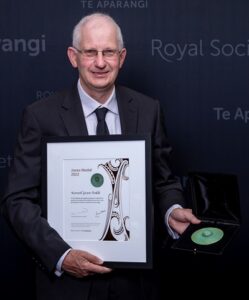Congratulations to Ken Dodds, AgResearch, on been awarded the Jones Medal, for a lifetime achievement in pure or applied mathematics or statistics, by Royal Society Te Apārangi for his work developing and applying statistical methods for genetic data analysis that enable the use of low-cost genotyping in primary industries and ecology.

Ken Dodds
Kenneth G Dodds has worked for AgResearch (and predecessor organisations) since 1986 after completing is PhD in statistical genetics with Bruce Weir at North Carolina State University. Since that time, he has not only provided statistical design and analysis for animal genetics and reproduction, but also driven a number of key developments in analytical methodology that have had a major impact on New Zealand industry. He has also been instrumental in the adoption and implementation of a variety of new analytical procedures that have had a significant impact on research output by others. These include: linkage and linkage disequilibrium mapping and genome wide association studies which have been instrumental in identifying a number of major genes of commercial impact to New Zealand. Perhaps most importantly has been Ken’s adaption, extension, and development of the statistics of parentage assignment, and mixed model analysis for the estimation of breeding values. Many species have benefited from his work but especially the New Zealand sheep, deer, salmon, and forage industries.
Ken has been involved in a wide variety of collaborations in both New Zealand and overseas and with a diverse group of researchers. Perhaps under-recognised has been his contribution to many summer interns, masterate, and PhD students over a long period of time. More recently he has taken a more active role as a formal supervisor of several statistical PhD students. During his career, Ken has been the author or co-author of some 318 publications,10,884 citations, h index of 47 according to Google scholar. Furthermore, Ken has the highest Researchgate score in AgResearch: at 48.31. Ken is consistently one of AgResearch’s top members by number of reads and research interest.
Ken’s work has had a major impact on the following industries:
- His work on DNA parentage assignment has impacted on the New Zealand sheep, deer, dairy goat, beef and salmon industries to name just a few as they all have, and still do, use software written primarily by him. In the case of the deer industry this has extended to nearly a 30-year period (Dodds et al 1996, Theoretical and Applied Genetics, 92: 966-975; 84 citations). Much of the improvement in genetic progress of the New Zealand sheep and deer industry has been dependent on this software.
- Variants of this software, such as partial parentage for estimating breeding values, were included in Sheep Improvement Limited and stand-alone evaluations for some 15 years (Dodds et al, 2005, Journal of Animal Science, 83: 2271-2279; 80 citations). More recently over the past 7 years the DNA parentage software has been updated to use the low coverage “noisy” data commonly called genotyping by sequencing (KGD package, Dodds et al 2015, BMC Genomics,16: 1047; 103 citations). This software is available on Github (https://github.com/AgResearch/KGD) an open software repository. Ken maintains and updates this software and provides advice to the users. Currently, in AgResearch alone some 240,000 DNA samples each year use variants of this software for DNA parentage assignment. This has been extended to conservation genomics application that includes species such as Takahē and Kākāpō.
- Ken created and wrote the KGD package mentioned above, which was the first software to explicitly handle in a statistically correct and efficient way low coverage and probabilistic genotypes for the creation of genomic relationship matrices and all the downstream utility they provide (GBLUP and ssBLUP breeding values, PCA plots, inbreeding estimates, parentage assignment, mate allocation). This has greatly expanded the use of this low-cost sequencing technology for genetic improvement in the farmed salmon and dairy goat industries, particularly, among many others and ssBLUP is currently being implemented in the New Zealand deer industry based on KGD software.
- Ken has been the statistical analysis guru behind the following major advancements in genomics knowledge:
-
- Discovery of the BMP15 mutation (Inverdale) in sheep, Nature Genetics, 25: 279-283; 1308 citations
- Discovery of the BMP-1B mutation (Booroola) in sheep, Biology of Reproduction, 64: 1225-1235; 707 citations
- First, second and third linkage maps of sheep, 1995 (Genetics, 140: 703-724), 1998 (Mammalian Genome, 9: 204-209), 2001 (Genome Research, 11: 1275-1289); 1098 citations
- Mapping and use of the GDF8 mutation in sheep (NZ slaughtered sheep now have a proportion of ~0.3 for this mutation increasing lean meat yield introduced with the importation of Texels).
- However, this only summarises a small amount of his impact through the 318-odd publications that he has been associated with as author or co-author. These have covered advances in the genetics of wool, meat, meat quality, reproduction, and disease resistance. The results of many have subsequently been implemented into the routine industry genetic evaluation in a wide variety of ruminant, aquaculture and plant species. His statistical input has specifically underpinned improvement in the New Zealand sheep and deer industry for over 25 years.
In summary, Ken has contributed immensely to the scientific output of a wide variety of research scientists and students by his contribution to experimental design, statistical analysis and interpretation. In addition to that substantial contribution, he has driven and advanced the field of his specific expertise, not only scientifically, but also in its commercial application in industry. This has underpinned the New Zealand sheep and deer industry genetic improvement over the last 30 years.
In December 2021 Ken also received an Individual/Lifetime Achievement Award in the 2021 Science New Zealand Awards for Crown Research Institutes.
The video at https://sciencenewzealand.org/news-and-events/awards/ about Ken is at 41:35-44:12.
The 2022 awards presented in Ōtepoti Dunedin on 16 November: https://www.royalsociety.org.nz/news/research-honours-aotearoa-winners-celebrated-in-otepoti-dunedin/
Additional 2022 Research Honours Aotearoa awards will be presented on Tuesday 22 November in Te Whanganui-a-tara Wellington.
The first 2022 Research Honours Aotearoa awards were presented in Kirikiriroa Hamilton on 9 November.
Contributed by Harold Henderson
